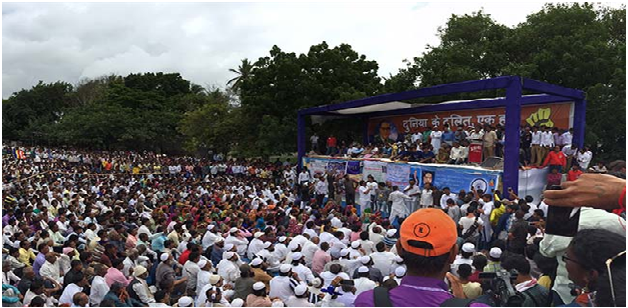Dalit Assertion Stirs Caste Cauldron: BJP In A Fix

AHMEDABAD: “The Dalit Asmita Yatra is a testimony to the fact that a people's movement can be a roaring success despite a virtual blackout by large sections of news media and reaffirms the need for grass root politics with ground level mobilization and people connect” observed one of the young leaders of the movement Dalit Asmita Yatra on his Facebook Wall.
The very fact that thousands defied attacks and violence to reach Una, take a pledge for empowerment, and resolve to carry on the stir as a ‘rail roko’ after a month if their demands for justice were not heard by the Gujarat government is indicative of what the organisers called a “new awakening.” Upper castes attacked Dalits on motorcycles, and the padyatris at different points with the organisers pointing out that the police took at least 3 days to make the first arrests of those who had “attacked Dalits, vandalized vehicles and threatened those who wanted to join the rally.” Despite this the Dalits braved the threats and attacks and marched for the rally that is not just a first for Gujarat but for India.
The enthusiasm was infectious, and the Dalits and Muslims at the rally knew that that a corner had been turned. The participation was vocal, with songs, slogans, applause and cheers as the young of India led the rally and addressed the gathering. Rohith Vemula, who committed suicide in Hyderabad Central University for callous discrimination and punishment, was represented by his mother who got a huge applause. As did Jawaharlal Nehru University Students Union President Kanhaiya Kumar. The meeting accepted the young leadership, with the young and passionate Jignesh Mewani emerging as a leader of the movement, with all in the Dalit Asmita Yatra working day and night to ensure the Mahasammelan’s resounding success.
This kind of a spontaneous upsurge has not been witnessed in contemporary India, not even under the Bahujan Samaj party and Mayawati. The effort to truly emancipate Dalits from the yoke of slave labour, such as scavenging, removing carcasses, and cleaning sewers as a profession, has not been seen from all the various Dalit leaders who have started their own political parties, and used these to negotiate berths and positions with the mainstream national parties. This was thus, a first where the Dalits were made to directly counter the humiliation of caste based professions with a pledge of emancipation, and moved towards the direction of a prolonged stir if their demands for justice and economic upliftment were not met.
Many of the Dalits are returning to villages where upper castes, furious with this assertion, are issuing threats. Reports are coming in from Gujarat state that many of the Dalits are fearful of returning to their villages for fear of caste reprisal. The state government is visibly worried over the visible upsurge and consolidation of the 8 per cent Dalit vote with the Muslims who attended the Una rally as well in sizeable numbers. The anger palpable in Una has sent waves into both Punjab and Uttar Pradesh, that are getting ready for the state elections. The Gujarat government is in a fix, as any violence against the Dalits now, will consolidate a huge vote bank against the BJP in the two election-going states, with UP in particular being crucial for the party.
It is unlikely that the state or for that matter central governments will meet the demands for land, for justice that will take away from the upper caste support for the BJP. The call for a ‘rail roko’ stir in September if the demands are not met, has placed the ruling BJP in a bind. As a crackdown on the leaders will further alienate the Dalits and impact directly on the forthcoming Assembly elections on the one hand, and on the other if the rail roko stir does take place it will serve as a direct admonishment of both the state and central governments.



